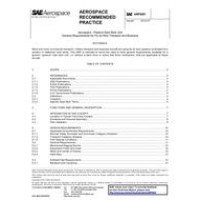This SAE Aerospace Recommended Practice (ARP) defines lightning strike zones and provides guidelines for locating them on particular aircraft, together with examples. The zone definitions and location guidelines described herein are applicable to Parts 23, 25, 27, and 29 aircraft. The zone location guidelines and examples are representative of in-flight lightning exposures.The purpose of this ARP is to provide information to determine the lightning attachment zones which is referred to as Lightning Zoning. This ARP is used in conjunction with two other documents, ARP5412 and ARP5416. The relationship between the three documents is shown in Figure 1. These three documents are used to define the aircraft lightning threat and tests required to support the aircraft lightning protection certification.Lightning zoning is a functional step in demonstrating that the aircraft is adequately protected from both direct and indirect effects of lightning. The purpose of lightning zoning is to determine the surfaces of the aircraft which are likely to experience lightning channel attachment and the structures which may experience lightning current conduction between pairs of entry/exit points.Zoning should be used with the aircraft hazard assessment to determine the appropriate protection for a given aircraft part or location. To determine the appropriate protection for parts and structure in a particular lightning zone, the criticality of the systems or structure in the zone should be considered.
 PDF
PDF
All of our standards document are available in PDF (Portable Document Format), an electronic, downloadable format.You will be able to download the file in your account downloads.
 Multi-User Access
Multi-User Access
After purchasing, you have the ability to assign each license to a specific user.
 Printable
Printable
At any time, you are permitted to make printed copies for your and your members' reference use.
 PDF
PDF
 Multi-User Access
Multi-User Access
 Printable
Printable





